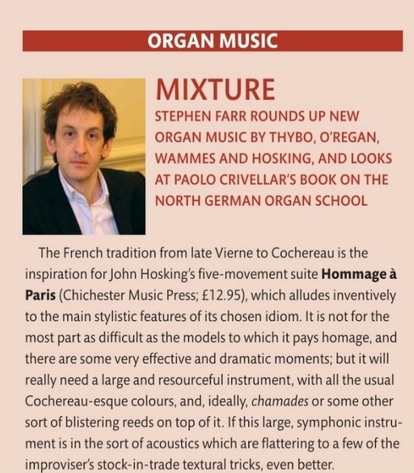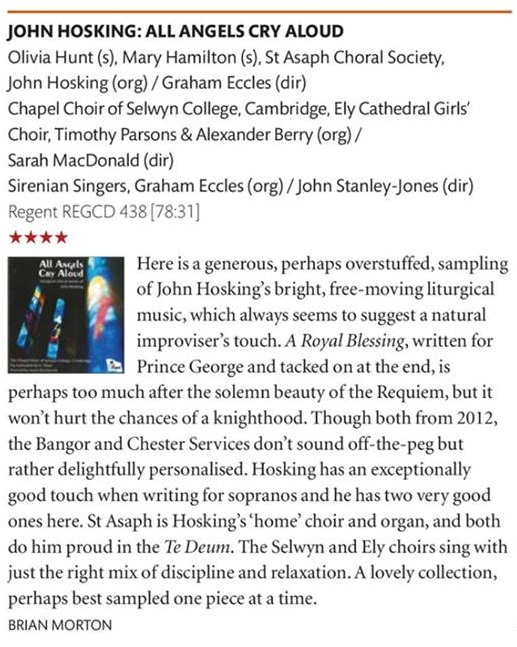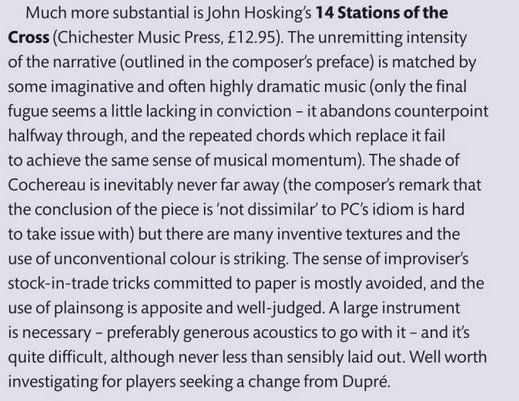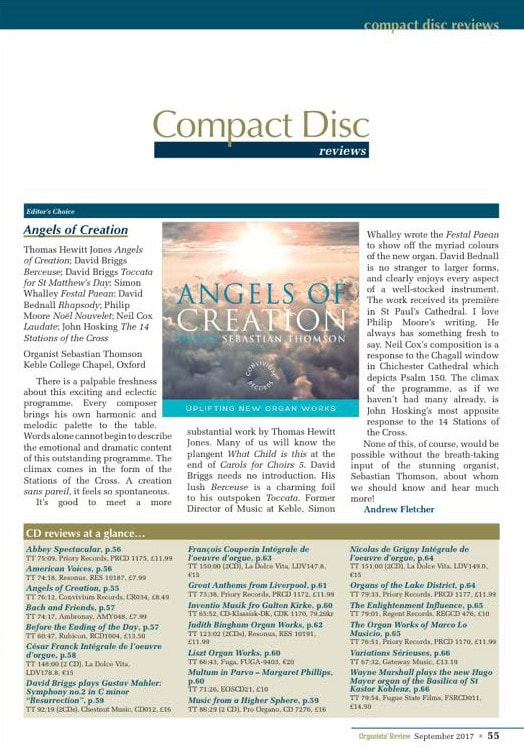Reviews
 Review from "Choir and Organ"
Review from "Choir and Organ"
SOLO ORGAN RECITAL – Derby Cathedral, August 2014 - The Derby Telegraph
John Hosking's recital in Derby Cathedral was characterised by precise articulation and consistent phrasing, facets of his style which supported his opening piece, Prelude and Fugue (Hommage à Paris). This is one of Mr Hosking's own compositions and is an eclectic, virtuoso reflection on the styles of many of the notable Parisian organists of the late 19th and early 20th centuries. The powerful battery of reeds on the Derby Compton was equal to the style of the piece, as indeed they were in several other pieces during the recital.
David Briggs' Variations on Greensleeves is a delightful piece that explores the rich potential created by the ambiguous nature of Elizabethan modality and the developing diatonic harmony of the period, richly overlayed with twentieth century dissonance. Mr Hosking utilised the broad palette of softer colours on the organ to create an evocative, and at times, tender performance. The imitative entries in the final variation were crisp and well-matched, creating a worthy climax.
In a return to France, Mr Hosking played Poème de Printemps by Henry Geehl, a piece well-suited to the Compton's heritage. The performance had a pleasing fluidity with registrations that provided a pleasant foil to the preceeding pieces. Performing Bach in a recital used to be considered almost a duty, though modern recital programmes cater to a broader taste and, like Mr Hosking's programme, explore a wide range of styles, so to hear one of Bach's major organ works, Passacaglia and Fugue in C minor BWV 582 is unusual. Mr Hosking chose to adopt an austere and uncompromising approach with weighty registrations for the opening and closing sections, though his interpretation of the overall structure of the work was very interesting.
Staying in Germany, this time with Georg Bohm's Vater unser im Himmelreich, Mr Hosking demonstrated his empathy with the German art of ornamentation which complemented his careful attention to phrasing and articulation. This was an elegant performance of considerable beauty.
CPE Bach's search for a new, more dramatic style found expression in his Sonatas and also in his Fantasia and Fugue in C minor, the piece chosen by Mr Hosking to support the recital series theme of CPE Bach. The consistency of Mr Hosking's phrasing and articulation that so characterised the earlier pieces in his programme, brought the fugue to life. Master Tallis's Testament (Herbert Howells) and Fanfare (John Cook) are stylistic opposites, the Howells requiring considerable subtlety and sensitivity, the Cook considerable panache and control. For me, the Cook was the most successful piece of the evening, with well-balanced registrations creating a fine, festive atmosphere.
The final two pieces of the programme took us back to Germany: Joseph Rheinberger, who lived most of his life in Germany, and Max Reger. Rheinberger's Intermezzo from Sonata No. 6 in Eb minor provided a nice contrast to the Cook and the Reger which was to follow. The Intermezzo is a delicate piece with flowing melodic material supported by sympathetic harmony, stylistically a world apart from Reger's Variationen und Fuge über Heil, unserm König, Heil, (familiar to English audiences as God Save the Queen). The Variationen und Fuge is a tour de force requiring a flawless technique, the ability to manage demanding registration changes - which were accomplished with a practised ease - and the creation a crashing climax at the end of the Fugue.
The Guardian - June 2016
"John Hosking has spent his life in the organ loft (St Martin-in-the-Fields, Westminster Abbey and the cathedrals of Lincoln, Truro and, currently, St Asaph). All that practical experience has given him a deep knowledge both of what works in a liturgical setting and of the choral tradition’s rich repertoire. The ghost of Duruflé is evident in his beautiful Chester Service (with a cheeky reference to Messiaen’s La Nativité du Seigneur along the way); Herbert Howells hovers over his Bangor Service, while A Royal Blessing could be by John Rutter. Yet for all these influences Hosking maintains his own distinctive voice, particularly in his impressive Requiem."
John Hosking's recital in Derby Cathedral was characterised by precise articulation and consistent phrasing, facets of his style which supported his opening piece, Prelude and Fugue (Hommage à Paris). This is one of Mr Hosking's own compositions and is an eclectic, virtuoso reflection on the styles of many of the notable Parisian organists of the late 19th and early 20th centuries. The powerful battery of reeds on the Derby Compton was equal to the style of the piece, as indeed they were in several other pieces during the recital.
David Briggs' Variations on Greensleeves is a delightful piece that explores the rich potential created by the ambiguous nature of Elizabethan modality and the developing diatonic harmony of the period, richly overlayed with twentieth century dissonance. Mr Hosking utilised the broad palette of softer colours on the organ to create an evocative, and at times, tender performance. The imitative entries in the final variation were crisp and well-matched, creating a worthy climax.
In a return to France, Mr Hosking played Poème de Printemps by Henry Geehl, a piece well-suited to the Compton's heritage. The performance had a pleasing fluidity with registrations that provided a pleasant foil to the preceeding pieces. Performing Bach in a recital used to be considered almost a duty, though modern recital programmes cater to a broader taste and, like Mr Hosking's programme, explore a wide range of styles, so to hear one of Bach's major organ works, Passacaglia and Fugue in C minor BWV 582 is unusual. Mr Hosking chose to adopt an austere and uncompromising approach with weighty registrations for the opening and closing sections, though his interpretation of the overall structure of the work was very interesting.
Staying in Germany, this time with Georg Bohm's Vater unser im Himmelreich, Mr Hosking demonstrated his empathy with the German art of ornamentation which complemented his careful attention to phrasing and articulation. This was an elegant performance of considerable beauty.
CPE Bach's search for a new, more dramatic style found expression in his Sonatas and also in his Fantasia and Fugue in C minor, the piece chosen by Mr Hosking to support the recital series theme of CPE Bach. The consistency of Mr Hosking's phrasing and articulation that so characterised the earlier pieces in his programme, brought the fugue to life. Master Tallis's Testament (Herbert Howells) and Fanfare (John Cook) are stylistic opposites, the Howells requiring considerable subtlety and sensitivity, the Cook considerable panache and control. For me, the Cook was the most successful piece of the evening, with well-balanced registrations creating a fine, festive atmosphere.
The final two pieces of the programme took us back to Germany: Joseph Rheinberger, who lived most of his life in Germany, and Max Reger. Rheinberger's Intermezzo from Sonata No. 6 in Eb minor provided a nice contrast to the Cook and the Reger which was to follow. The Intermezzo is a delicate piece with flowing melodic material supported by sympathetic harmony, stylistically a world apart from Reger's Variationen und Fuge über Heil, unserm König, Heil, (familiar to English audiences as God Save the Queen). The Variationen und Fuge is a tour de force requiring a flawless technique, the ability to manage demanding registration changes - which were accomplished with a practised ease - and the creation a crashing climax at the end of the Fugue.
The Guardian - June 2016
"John Hosking has spent his life in the organ loft (St Martin-in-the-Fields, Westminster Abbey and the cathedrals of Lincoln, Truro and, currently, St Asaph). All that practical experience has given him a deep knowledge both of what works in a liturgical setting and of the choral tradition’s rich repertoire. The ghost of Duruflé is evident in his beautiful Chester Service (with a cheeky reference to Messiaen’s La Nativité du Seigneur along the way); Herbert Howells hovers over his Bangor Service, while A Royal Blessing could be by John Rutter. Yet for all these influences Hosking maintains his own distinctive voice, particularly in his impressive Requiem."
|
Crossrhythms
"That Hosking remains in complete control throughout is testament to his fine playing and for a mid-priced disc the whole is excellent value and one that organ lovers will appreciate." Cathedral Music Magazine "Herbert Howells's Gloucester Service, featured here for the Visitation and Candlemass, receives spine tingling accompaniments from John Hosking on the magnificent Father Willis organ." Swedish Newspaper Review "The organ maestro, John Hosking..... brilliantly played his way through a witty Buxtehude prelude and eminently showed his strength in the first movement of Vierne's tumultuous organ-symphony number 2. Once again the Cathedral organ showed its power by interpreting the most resounding French organ pieces in a magnificent and ecstatic way." Organists' Review "I was rivoted from first to last by the outstanding playing of John Hosking. Taking technical accomplishment as read, the depth and interpretational insight within this programme is profound. The Weitz Symphony is lifted to a truly exalted plane, Howells sounds as fresh and innovative as it must have appeared when first heard, and his Vierne is thoroughly a la mode. The Franck B minor is played with particular beauty and emotional power, each phrase being beautifully-shaped, yet the whole never sounding fragmented into its many sections: quite an achievement. This 24 year-old is clearly destined for Great Things." Cathedral Music Magazine "His playing is equal to all the challenges the music sets him" Choir and Organ "John Hosking stylishly and skilfully puts the versatile Wood rebuild at St Asaph through its paces in a wide ranging programme of variations. JSB rubs shoulders with Reger, contemporary composers and a former St Asaph musician with evidence of numerous shades of Cochereau from actual to ‘après’ along the way. There is also a well-constructed improvisation from Hosking himself. Instrument and player come over effectively on this disc seemingly aimed at a broad listening public, and although ‘variation overload’ is avoided, not all the music quite holds similar interest levels. As usual, the production by Regent is excellent." Alastair Johnston Choir and Organ |
International Record Review “The tension within the music in performance is palpable...” "Hosking's "Improvisation on the Te Deum"..... is an excellently structured improvisation, full of tonal interest. I'll definitely be listening to it again." Journal of the Association of Anglican Musicians "John Hosking, Christopher Gray, and our stalwart Lance Andrews have given a superb recording for sound" Crossrhythms "Be warned: the opening bars of this recital are loud enough to blow your speakers. The piece is "Passacaglia & Fugue on B. A. C. H." by Sigfrid Theodor Karg-Elert and his take on Johann Sebastian leans more towards the Toccata and Fugue than the tranquillity of sheep safely grazing. It is good, though, and certainly allows John Hosking to put the Father Willis Organ of Truro Cathedral through its paces. Hosking, a Cornishman who is now the assistant organist at St Asaph's Cathedral, plays superbly and producer/engineer Gary Cole is to be applauded for such a clear recording." CNEWOCA Newsletter "I mentioned two versions of the [Reubke] that were issued in quick succession, the first by Roger Fisher played here at Chester Cathedral and the other by John Hosking at Truro Cathedral. In my view it would be difficult to listen to a better version that either of these" International Record Review "The organ contributions by John Hosking are in good style" Choir and Organ |



